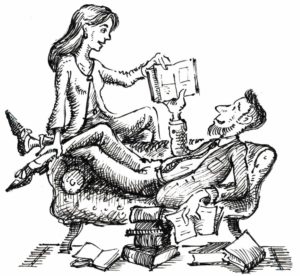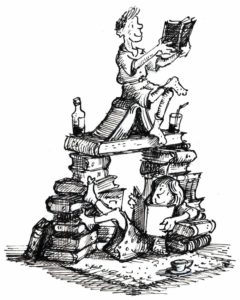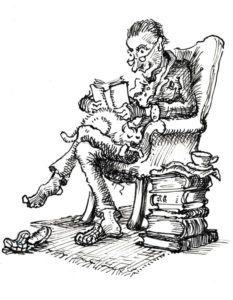Books To Walk A Dog With
A Tree Grows In Brooklyn
Betty Smith
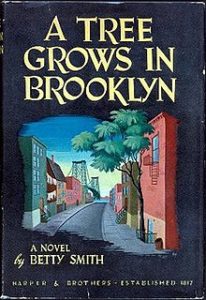 This is a book that delights and is an early text to detail social capital. It speaks of poverty and what it is to be poor – it is a book highlighting social conscience even if not written with socio-political motives – yet delineates the social implication of poverty, exploitation, despair, loneliness and worthlessness: it in fact does not measure poverty in economic terms.
This is a book that delights and is an early text to detail social capital. It speaks of poverty and what it is to be poor – it is a book highlighting social conscience even if not written with socio-political motives – yet delineates the social implication of poverty, exploitation, despair, loneliness and worthlessness: it in fact does not measure poverty in economic terms.
Also it has other themes bubbling below its surface: the older the book’s heroine becomes, so her reveries take on a darker hue as poverty is interpreted with less innocence. It is an archetypical tale of the American Dream, for the Nolan family seeks to clamber the social pole (indeed the book’s ultimate symbol, the tree planted in the midst of tenements, of its title grows, even if in arid conditions). This is a novel with many layers, requires a response, and teases us to a conclusion.
The Great Gatsby
F. Scott Fitzgerald
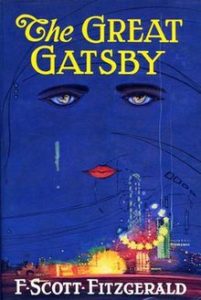 This is a modern day fairy tale, a tale of admonishment that shatters the American Dream: the excess of wealth, the folly of youth, resistance to change, Gatsby as a ravenous materialist but still spiritually thirsty. No book perhaps sums up the failures of the American world between the two World Wars, the so-called ‘jazz age’ of improvisation when life and discourse were on the hoof, bootlegged and shambolic, not sustained by any moral certainty: he is like the urbane and white bandleader Paul Whiteman, fights shy of the real world (or Ellington’s jungle music), makes a splash but doesn’t get to the nitty-gritty ever.
This is a modern day fairy tale, a tale of admonishment that shatters the American Dream: the excess of wealth, the folly of youth, resistance to change, Gatsby as a ravenous materialist but still spiritually thirsty. No book perhaps sums up the failures of the American world between the two World Wars, the so-called ‘jazz age’ of improvisation when life and discourse were on the hoof, bootlegged and shambolic, not sustained by any moral certainty: he is like the urbane and white bandleader Paul Whiteman, fights shy of the real world (or Ellington’s jungle music), makes a splash but doesn’t get to the nitty-gritty ever.
Its title, with Fitzgerald lacklustre over its final choice (“only fair, rather bad than good”), has become iconic, although redolent of its rambling and inchoate prose. The books bumpy landing and poor sales were in keeping with its chequered history. Fitzgerald of course died presuming he had been a failure, although The Great Gatsby’s afterlife has seen it assume the mantle of the Great American Novel, undeservedly so, for it is not Fitzgerald at his best. It is a flawed piece whose whole is greater than the sum of its parts: the perseverance of marketing chutzpah and the expectation of the reader take pole position.
Excellent Women
Barbara Pym
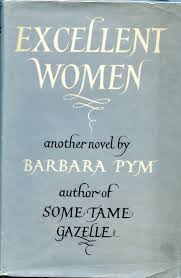 This was the second of Barbara Pym’s novels to be published, cited often as the wittiest. Its title derives from a condescending reference to the neo-deferential class of women do-gooders of post-war middle class Britain, the standard Pym character, Mrs Dale’s Diary with tea and scones, jumble sales and local church politics rather than syringes and medicine as banter (incidentally both this early Light Service soap opera and Pym were forerunners in acknowledging gay sensibilities at more or less the same time). As is always the case with Pym, the plot is only the skeleton upon which hangs the torso of the latter-day Jane Austen: superficial social debris but really a palimpsest of social irony, social tragedy, desire, unfulfillment, social relations and indeed the social condition: this is writing deeply etched with sonority and percipience.
This was the second of Barbara Pym’s novels to be published, cited often as the wittiest. Its title derives from a condescending reference to the neo-deferential class of women do-gooders of post-war middle class Britain, the standard Pym character, Mrs Dale’s Diary with tea and scones, jumble sales and local church politics rather than syringes and medicine as banter (incidentally both this early Light Service soap opera and Pym were forerunners in acknowledging gay sensibilities at more or less the same time). As is always the case with Pym, the plot is only the skeleton upon which hangs the torso of the latter-day Jane Austen: superficial social debris but really a palimpsest of social irony, social tragedy, desire, unfulfillment, social relations and indeed the social condition: this is writing deeply etched with sonority and percipience.
Pym is the epitome of this style of writing, and she is so true that her books are like arrows to the heart. Angela Thirkell’s writing, although it matures in time, never came close to Pym for subtlety. So too the later exponents of the ‘Pym school’, the pastel shaded covers of 1990s’ observant women’s fiction – Mary Wesley, Joanna Trollope and their like, which were so hollow in comparison. This highlights how brilliant Pym was, writing that is so well crafted that it is impossible to see its glue, and her depiction of life, society and character sizzles with delight.
To Kill A Mockingbird
Harper Lee
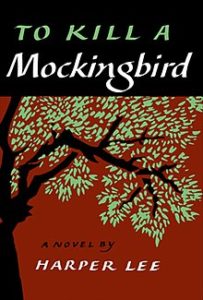 This is a misleading book. Full of warmth and good humour, it has sold like hotcakes, been set as a school text, won the Pulitzer Prize and placed Harper Lee at the apex of American literature, yet nonetheless deals with the serious issues of rape and racial inequality. (Rather as Michael Jackson’s songs on Thriller are not at all what might be expected of one of the bestselling albums of all time.) The book attracts scant academic interest and so maintains its mythical status. Technically it is a tour de force, Lee’s storytelling skills without equal as she interwove the childish voice with flashback, that is an adult woman’s musing in retrospect. Lee detached herself from any discussion on the book not long after it was published, but her best note was this: “Surely it is plain to the simplest intelligence that To Kill A Mockingbird spells out in words of seldom more than two syllables a code of honor and conduct, Christian in its ethic…”
This is a misleading book. Full of warmth and good humour, it has sold like hotcakes, been set as a school text, won the Pulitzer Prize and placed Harper Lee at the apex of American literature, yet nonetheless deals with the serious issues of rape and racial inequality. (Rather as Michael Jackson’s songs on Thriller are not at all what might be expected of one of the bestselling albums of all time.) The book attracts scant academic interest and so maintains its mythical status. Technically it is a tour de force, Lee’s storytelling skills without equal as she interwove the childish voice with flashback, that is an adult woman’s musing in retrospect. Lee detached herself from any discussion on the book not long after it was published, but her best note was this: “Surely it is plain to the simplest intelligence that To Kill A Mockingbird spells out in words of seldom more than two syllables a code of honor and conduct, Christian in its ethic…”
A recent survey amongst British librarians ranked the book ahead of the Bible as one “every adult should read before they die,” which seems pretty outrageous to me, but librarian are only second-class citizens.


